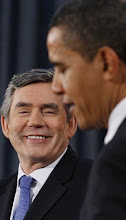Suddenly forced to make the transition from reflection to decision, I had to learn the difference between a conclusion and a policy. It was no longer enough to be plausible in argument; one had to be convincing in action. Problems were no longer theoretical...
Any statesman is in part a prisoner of necessity. He is confronted with an environment he did not create, and is shaped by personal history he can no longer change. It is an illusion to believe that leaders gain in profundity while they gain experience. The convictions that leaders have formed before reaching high office are the intellectual capital they will consume as long as they continue in office. There is little time for leaders to reflect. They are locked in an endless battle in which the urgent constantly gains on the important. The public life of every political figure is a continual struggle to rescue an element of choice from the pressure of circumstance.
When I entered office, I brought with me a philosophy formed by two decades of the study of history. History is not, of course, a cookbook offering pretested recipes. It teaches by analogy, not by maxims. It can illuminate the consequences of actions in comparable situations, yet each generation must discover for itself what situations are in fact comparable. No academic discipline can take from our shoulders the burden of difficult choices.
If history teaches us anything it is that there can be no peace without equilibrium and no justice without restraint. But I believe equally that no nation could face or even define its choices without a moral compass that set a course through the ambiguities of reality and thus made sacrifices meaningful. The willingness to walk this fine line marks the difference between the academic's - or any outsiders - perception of morality and that of the statesman. The outsider thinks in terms of absolutes; for him right and wrong are defined in their conception. The political leader does not have this luxury. He rarely can reach his goal except in stages; any partial step is inherently morally imperfect and yet morality cannot be approximated without it. The philosopher's test is the reason behind the maxims; the statesman's test is not only the exaltation of his goals but the catastrophe he averts... once thwarted the consequences can never be proved. The dialogue between the academic and the statesman is therefore always likely to be inconclusive.
Yet there is a margin between necessity and accident, in which the statesman by perseverance and intuition must choose and thereby shape the destiny of his people... The statesman's responsibility is to struggle against transitoriness and not to insist that he be paid the coin in eternity. He may know that history is the foe of performance; but no leader is entitled to resignation. He owes it to his people to strive, to create, and to resist the decay that besets all human institutions.
-Excerpt from Henry Kissinger's White House Years
skip to main |
skip to sidebar


















observe, orient, decide, act
Make Perception Great Again

Election 2016
college campus psychosis

Search PerceptionAsReality

Establishment v. Trump





It is easier to deceive a multitude than one man.
-Herodotus
-Herodotus
To hear rightly is the beginning of living rightly.
-Plutarch
-Plutarch
Gonzales Flag

Goliad Flag

Gadsden Flag

Fort Moultrie Flag



smitten

not smitten


support perceptionasreality



